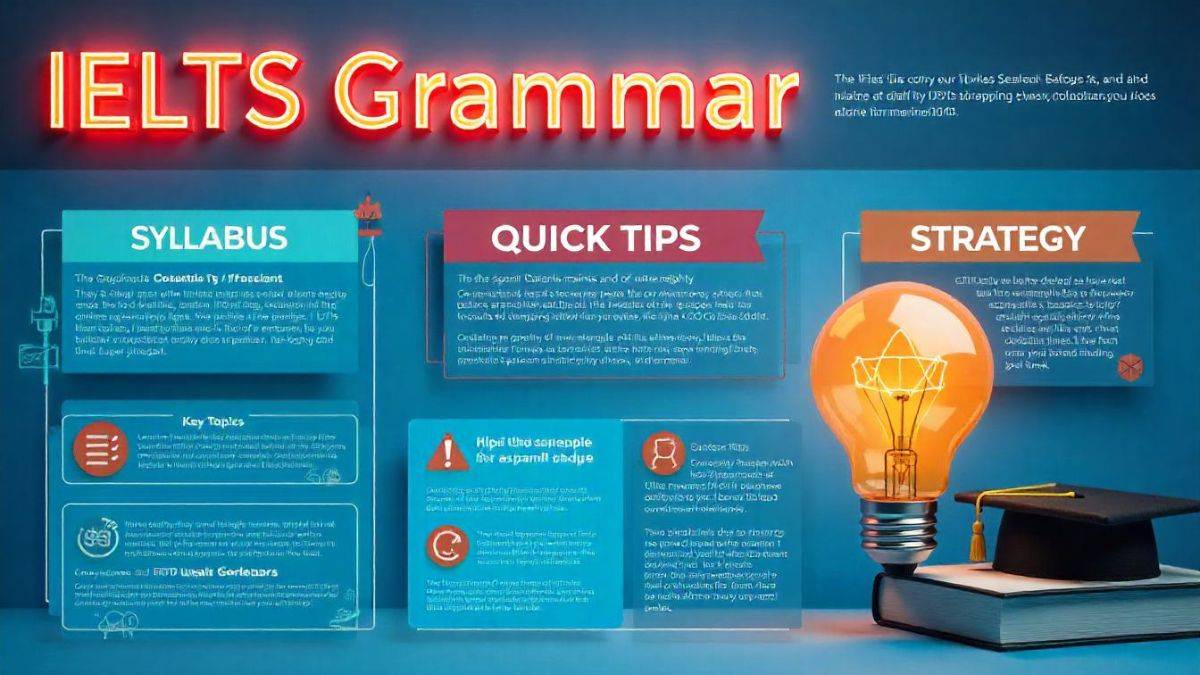If you're planning to take the IELTS exam, you already know that grammar is really important. Even though there is no separate grammar section in IELTS, grammar is used in all four parts of the test: Reading, Writing, Listening, and Speaking.
If you want study abroad, then taking IELTS test is must. The IELTS test checks how good your English language is. So you need strong grammar for IELTS. Grammar is base of English. This article will help you with grammar for IELTS, IELTS syllabus, books, common mistakes, tips to avoid, and IELTS preparation tips.
In IELTS Writing and Speaking, grammar is 25% of score. But many mistakes also make your ideas not clear, can lower score in coherence and lexical resource.
Good grammar makes answers easy to understand and can give better scores, mostly in writing and speaking. Knowing grammar means you use sentences right, correct verb tenses, punctuation right. Many students confuse with "a," "an," "the", it make things messy. So strong grammar for IELTS is very important for high IELTS score.
- Why is Grammar Important in IELTS?
- How Grammar Affects Your IELTS Score?
- Topics to Learn for IELTS Grammar
- IELTS Grammar Skills Tips
- How to Avoid Making Mistakes in IELTS Grammar
Why is Grammar Important in IELTS?
Even though grammar is 25% of score in Speaking and Writing, mistakes can also reduce your score in coherence and cohesion and lexical resource in IELTS Writing. If sentences have too many grammar mistakes, examiner may not understand meaning, this can lower your overall IELTS score.
How Grammar Affects Your IELTS Score?
IELTS Writing – Grammar Band Descriptions
The table given below has been taken from IELTS band descriptors and provides information about the scoring criteria of the IELTS Writing section, with respect to grammar:
| IELTS Writing Band Scores |
|
|---|---|
| Band |
Grammatical Range and Accuracy |
| 9 |
|
| 8 |
|
| 7 |
|
| 6 |
|
| 5 |
|
| 4 |
|
| 3 |
|
| 2 |
|
| 1 |
|
IELTS Speaking – Grammar Band Descriptions
The table given below has been taken from IELTS band descriptors and provides information about the scoring criteria of the IELTS Speaking section, with respect to grammar:
| IELTS Speaking Band Scores |
|
|---|---|
| Band |
Grammatical Range and Accuracy |
| 9 |
|
| 8 |
|
| 7 |
|
| 6 |
|
| 5 |
|
| 4 |
|
| 3 |
|
| 2 |
|
Topics to Learn for IELTS Grammar
There is no prescribed IELTS grammar syllabus. Still there are some common grammar related topics that should be helpful in your exams. Go through the below list of grammar topics to ace your IELTS grammar preparation.
- Nouns
- Pronouns
- Adjectives
- Verbs
- Adverbs
- Tenses
- Prepositions
- Conjunctions
- Subject Verb Agreement
- Pronoun Agreement
- Modifiers
- Parallelism
- Idioms
- Passive Voice
- Metaphor
- Simile and Figures of Speech
Also Read:
- Best Resources for IELTS Preparation
- Present Tense
- Present Perfect Continuous Tense
- Present Perfect Tense
IELTS Grammar Skills Tips
- You must focus on answering the questions rather than getting obsessed with putting in too many different sentence structures.
- Do not try to memorise the content of the books that we have mentioned above. Learn how to apply the content in your daily life conversations and on your mock tests.
- Not all of your sentences have to be complex. You must focus on accuracy and answering the questions. The construction of complex sentences is a skill that you develop over the entire length of your preparation.
- Focus more on your weak areas. You will get knowledge of your weak areas after you have taken a diagnostic test or a mock test. Try to be as specific as you can, and by specificity, we mean that you should be able to pinpoint the area where you are lagging behind, e.g. nouns, tenses, subject-verb agreement, etc.
- Practice a lot of questions.
How to Avoid Making Mistakes in IELTS Grammar
Here some tips to not make mistakes in IELTS grammar.
- Read practice tests and sample essays. Seeing how other students use grammar can help you know where you need improve.
- Get feedback on your writing. This you can get from any experts, friends or any one known.
- Use grammar checker. It not perfect but can find some common mistakes.
- Focus on accuracy more than speed. Better your grammar correct than write or speak fast.
- Everyone make mistakes. If you do, just keep talking or writing and communicate your ideas.
Cambridge English (Grammar For IELTS), English Grammar in Use by Raymond Murphy, and Oxford Practice Grammar are the most popular books. Along with this, we would definitely suggest Manhattan GMAT Sentence Correction.
University of Lancashire accepts country-specific qualifications from overseas applicants. Indian candidates who wish to pursue their higher studies from the university, must meet the University of Lancashire admission requirements for Indian students listed below:
Undergraduate Requirements:
- Higher secondary school certificate
- Overall score of 60% (80% for excellence scholarship)
- 60% - 70% in Standard XII English (IELTS 6.0 equivalent)
Graduate Requirements:
- Bachelor's or Master's degree in relevant field;
- Overall score of 58% in bachelor's degree (80% for excellence scholarship) or 55% in master's degree
- 65% - 75% in Standard XII English (IELTS 6.5 equivalent)
Pick your stage and get free guidance from counsellors who've helped thousands get into top universities.
 Starting research
Starting research Shortlisting colleges
Shortlisting colleges Exam preparation
Exam preparation SOP/LOR writing
SOP/LOR writing Scholarship & finance
Scholarship & finance Visa application
Visa application


Difficulty of any IELTS topic or subject depends on how much you prepare. Building strong IELTS grammar takes time. You need use real resources and practice everyday.